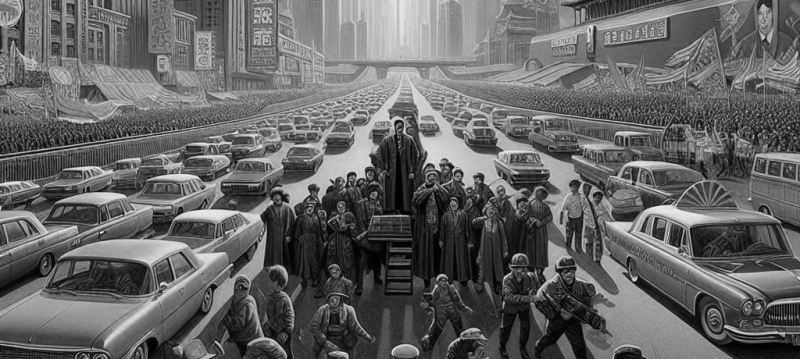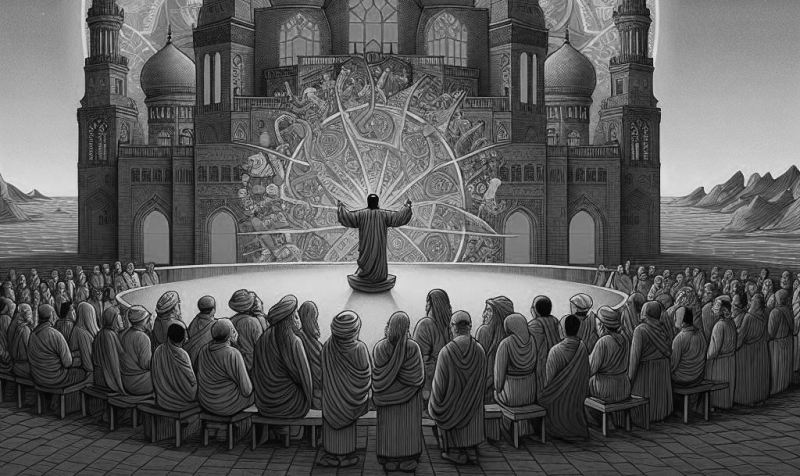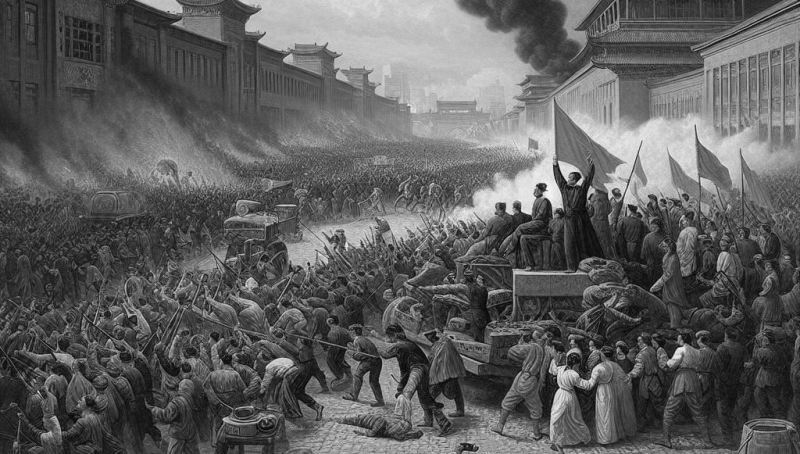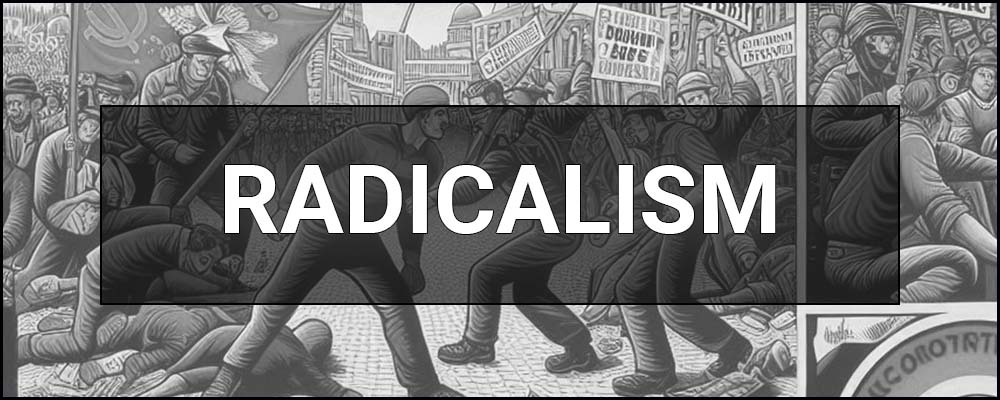Radicalism is an ideology or movement that seeks fundamental changes in the social, economic or political structure of society, often using progressive or revolutionary methods. The concept emphasizes the need to fundamentally rethink or restructure existing systems and is often associated with a wide range of political and social movements.
What is RADICALISM — concept and definition in simple words.
In simple words, Radicalism is a worldview or approach that calls for profound and often rapid change in society, politics, or economics.
It is not simply a desire to change something; it is a desire to fundamentally restructure the way systems or institutions work, sometimes even through revolutionary methods.

The origins and evolution of radicalism: a brief chronological overview of key developments.
Radicalism as an ideology has gone through a number of stages of evolution, each of which has contributed to shaping the modern understanding of the term:
- The Age of Enlightenment 17th-18th centuries: During this period, philosophers such as John Locke and Voltaire sought to rethink traditional political and social norms, laying the foundation for radical ideas about freedom and human rights.
- American and French Revolutions (late 18th century): These events symbolized the practical application of radical ideas, where citizens actively fought for democracy and civil liberties.
- Industrial Revolution (18th-19th centuries): With the development of industry and increased urbanization, new social classes and economic interests emerged, which contributed to the development of radicalism as a reaction to social inequality.
- Revolutions of the 19th century: A number of revolutions, particularly in Europe, demonstrated peoples’ desire for national self-determination and social justice, further establishing radicalism as a key political force.
- 20th century: New forms of radicalism emerged, associated with various political ideologies, from communism to fascism, which fundamentally changed the political landscape of the world.
Radicalism as an ideology has a long and varied history, with each stage reflecting changes in the worldview and socio-political aspirations of humanity. From the Enlightenment to the present, radicalism has always played an important role in shaping new social and political realities.

Who is a Radical — concept and definition in simple words.
In simple words, a Radical is a person who supports the idea of profound, sometimes even revolutionary, change in society, politics, or economics.
A Radical is not necessarily a good or bad person; rather, it is a characteristic of their views and methods of action. A radical is characterized by a desire for fundamental change, a departure from traditional approaches or a rejection of existing norms. They may seek positive change, such as fighting for human rights, but may also take extreme positions that lead to conflict or discord. So, a radical is a person whose ideas and actions are based on a desire for fundamental change, whether that change is perceived by society as positive or negative.
Influential historical figures and their contributions to the development of radicalism.
Radicalism would not be what it is today without the contributions of certain defining historical figures. Here are some of the most influential:
- Jean-Jacques Rousseau: His writings, particularly The Social Contract, are considered fundamental to the understanding of popular sovereignty and individual liberty, which had a huge impact on the French Revolution.
- Karl Marx: His theories on class struggle, outlined in Capital and The Communist Party Manifesto, became the basis for communist radicalism that influenced numerous revolutions and political movements of the 20th century.
- Mahatma Gandhi: His philosophy of nonviolent resistance became a radical strategy in the struggle for Indian independence and inspired numerous civil rights movements around the world.
- Rosa Luxemburg: Known for her work in the Social Democratic and Communist movements, she advocated the mass strike as a means of revolutionary struggle and criticized the development of bureaucracy in Soviet socialism.
- Martin Luther King: A prominent leader of the civil rights movement in the U.S., his sermons of nonviolence and equality had a global impact on the struggle for minority rights.
- Che Guevara: A revolutionary who became a symbol of the struggle against capitalism and imperialism, embodying the spirit of international radicalism.
- Emma Goldman: A prominent anarchist and activist, her work and advocacy of anarchism influenced radical movements around the world.
These individuals, each in their own time, played a key role in the formation and development of radicalism. Their ideas, ranging from the struggle for freedom to the pursuit of social equality, fueled movements and revolutions that influenced the further development of world civilizations.

Radicalism in politics.
Radicalism in politics is an approach that requires profound and often revolutionary changes in political structure and ideology.
It not only fosters the emergence of new political parties and organizations, but can also change the direction of existing ones. For example, the civil rights movements, led by individuals such as Martin Luther King, not only influenced American politics but also the global perception of human rights. Also, modern environmental and anti-globalization movements often have radical approaches to solving global problems, offering alternatives to traditional political solutions.
Examples of contemporary radical movements and parties:
The modern political landscape is marked by a variety of radical movements and parties, each with their own unique goals and ideology. Here are some of them:
- “Podemos”: a Spanish leftist party that emerged as a response to the economic crisis and corruption. Their radicalism lies in challenging traditional parties and systems of power, advocating for public participation and social justice.
- “Greens”: Environmental parties, present in many countries, that advocate radical changes in attitudes towards the environment, the fight against climate change and the transition to sustainable development.
- “Black Lives Matter”: An international movement that originated in the United States. It focuses on combating racism and police violence, demanding radical changes in the justice system.
- “Brexit Party”: A political party in the UK that has emerged to secure the country’s exit from the European Union. It reflects a radical desire for sovereignty and state autonomy.
- “Anti-Globalists”: – Various groups and movements that oppose globalization, believing that it leads to economic and social inequality. They demand radical changes in the world economic order.
- “Alternative for Germany”: A right-wing party in Germany that opposes immigration and the European Union, promoting nationalist and Eurosceptic ideas.
- “Syriza”: A left-wing party in Greece that opposes austerity measures and advocates socialist reforms including social justice and wealth distribution.
- “Five Star Movement”: An Italian party known for its anti-establishment, anti-corruption views and its commitment to direct democracy and environmental sustainability.
- “Yellow Vests”: A French social movement that emerged as a protest against rising fuel prices and high living costs, opposing economic inequality and the power of elites.
- “Antifa”: A left-radical movement that unites various anti-fascist groups and individuals. They actively oppose neo-Nazism, racism and discrimination, sometimes using radical methods of protest.
Minority rights and exotic movements.
As we deepen our overview of contemporary radical movements and parties, we will pay special attention to those that represent minority interests or have exotic views:
- “Indigenous movements” — These movements represent the interests of indigenous peoples around the world, advocating for their rights, land and culture. An example would be the “Indigenous Rights Movement in Australia”.
- “The Official Monster Raving Loony Party” — A British satirical political party that uses absurdity and humor to mock traditional politics and introduce exotic and unusual ideas into political discourse.
- “Marijuana Legalization Movement” — A movement that seeks the legalization of marijuana, active in many countries. This movement advocates not only for the free use of cannabis, but also for its decriminalization and medical use.
- “Pirate Parties” — These parties exist in different countries, focusing on digital rights, online privacy, government transparency and freedom of information, proposing radical changes in these areas.
- “LGBT+ Rights Movement” — A global movement that advocates for the rights of lesbian, gay, bisexual, transgender and other members of the LGBT community, seeking equality and against discrimination.
All of these movements and parties play an important role in contemporary political discourse, offering radical approaches to social, economic and environmental issues. They reflect the diversity of contemporary political radicalism and its impact on society.

Social radicalism is the pursuit of profound changes in social structure and cultural norms.
For example, the women’s rights movement in the twentieth century, which advocated for gender equality and women’s suffrage, can be considered a manifestation of social radicalism. Also in this category are civil rights movements, such as the struggle against racial segregation in the United States, led by Martin Luther King.
Social radicalism plays a key role in initiating and promoting large-scale social transformation. It is often a catalyst for change, pushing society to rethink and reform outdated paradigms, dogmas, and practices. Radical movements tend to strive for a more just and inclusive society, opposing discrimination, inequality and other forms of social injustice. They encourage dialog between different social groups, fostering consciousness raising and the development of new paradigms in social life.
Thus, social radicalism is an important element in the evolution of society, contributing to its development. From social movements demanding basic rights and freedoms to cultural transformations that change our ideas about norms and values, social radicalism continues to be a force that shapes a new reality for modern societies.
Religious radicalism: definition, historical and contemporary impact.
Religious radicalism is a movement or approach within religious groups that seeks profound, often radical changes in religious practice, beliefs, or the relationship between religion and society.
It can have both positive and negative effects, from promoting social reform to inciting conflict or extremism and terrorism.
Historical radical movements in religion:
- “Reformation” — A religious movement in 16th century Europe that led to the formation of Protestant churches and a radical revision of Catholic doctrine.
- “Calvinism” — A movement founded by John Calvin that advocated strict religious discipline and a reformation of society.
- “Puritanism” — A movement in England and America that sought to “purify” the church of Catholic elements.
- “Ismailism” — A branch of Shi’ism in Islam known for its radical reform ideas and esoteric approach to Islamic texts.
- “Hasidism” — A Jewish mystical movement that emerged in Eastern Europe in the 18th century, promoting a new, emotional approach to Judaism.
Modern radical religious movements:
- “Taliban” — An Islamist movement in Afghanistan known for its strict interpretations of Sharia law and radical social policies.
- Islamic State (ISIS) — A radical Islamist movement that has proclaimed the establishment of a “caliphate” in the territories of Syria and Iraq.
- “Haredim” — An ultra-orthodox branch of Judaism that advocates strict adherence to Jewish law and separation from the modern world.
- “Christian Fundamentalism” — A movement within Christianity that seeks a return to the “fundamentals” of the faith and a literal interpretation of the Bible.
- “Radical Buddhism” — The emergence of radical Buddhist movements, especially in Asian countries, that espouse nationalist and anti-immigrant ideas.
Religious radicalism, both historical and contemporary, continues to influence global religious and social landscapes, offering unique visions and generating debate and conflict in society.

Radicalism in economic theories.
Economic radicalism is the pursuit of profound and sometimes radical changes in economic systems and policies. This can encompass anything from advocating radical reform of the tax system to completely changing a country’s economic model, as was the case with communist or socialist revolutions. Economic radicalism often transcends the traditional left or right political scale by proposing innovative and sometimes even utopian approaches to wealth distribution, resource management, and production.
Impact on economic policy.
Economic radicalism has had a significant impact on various aspects of the world economy:
- Communist economic model: An example is the Soviet Union, where the communist model envisioned state ownership of the means of production and a planned economy that was radically different from capitalist systems. As we can see by now, the idea was utopian and not viable at all. Moreover, its realization resulted in millions of innocent victims.
- Socialist economic reforms: Countries such as Sweden or Denmark show socialist reforms with strong social programs and high taxation aimed at reducing social inequality.
- Protectionism and economic nationalism: Policies aimed at protecting domestic industries and jobs through taxes and other trade barriers, as was the case in the U.S. during Donald Trump’s presidency.
- Anti-globalization movements: Activists and groups that oppose the influence of international corporations and international financial institutions on national economies and sovereignty.
- Economic Activism and Social Entrepreneurship: An approach that combines economic success with social responsibility, encouraging the creation of businesses that solve social problems.
Economic radicalism thus influences the shaping of economic systems and policies at local, national and international levels, often causing profound social and economic change and sometimes crises.

Radicalism in cultural movements.
Cultural radicalism refers to the desire for profound changes in the cultural sphere, often causing a departure from traditional norms and values. It can be associated with various forms of art, literature, film, and other cultural aspects. For example, modernism in art and literature in the early 20th century, which rejected traditional genres and forms, promoting experimentation and innovation. Or the punk movement of the 1970s, which was a response to the social and political issues of the time, embodying a desperate desire for independence and anti-commercialism.
Influence on art and media:
- Avant-garde art: Movements such as cubism and abstractionism radically changed the perception of art, abandoning realistic representation in favor of experimentation with form and color.
- Literary experimentation: Writers such as James Joyce and Virginia Woolf made radical innovations in the form and structure of the novel, employing stream-of-consciousness and non-linear narrative techniques.
- Cinematic Innovations: The new wave in cinema, represented by directors such as François Truffaut and Jean-Luc Godard, shattered traditional cinematic canons, offering a new approach to visual language and storytelling.
- Musical revolutions: Rock ‘n’ roll, hip-hop, punk — all these musical genres emerged as forms of cultural radicalism, reflecting social problems and opposing the existing order.
- Social Media and the Internet: The digital revolution has paved the way for new forms of expression and communication, playing a key role in contemporary social movements and cultural debates.
Cultural radicalism is a powerful tool for social and cultural change, prompting the rethinking and reformatting of traditional approaches in art, literature, and media.
Radicalism in technology and innovation.
Radicalism in technology and innovation is expressed through disruptive change and breakthrough discoveries that fundamentally change existing industries and create new markets. This phenomenon encompasses not only the invention of new devices or programs, but also radical changes in approaches to problem-solving, product development, and even ways of thinking.
Examples of radical innovations that have changed industries and our world:
- The Internet: The launch and development of the Internet was one of the most important innovations of the 20th century, fundamentally changing the way we communicate, work, and perceive the world.
- Smartphones: The invention of the smartphone, especially the company’s first iPhone, revolutionized the mobile industry by making available multimedia, the internet, and a host of other features in a single device.
- Blockchain and Cryptocurrencies: Blockchain technology and the emergence of cryptocurrencies like Bitcoin and other altcoins have created a new way of conducting financial transactions, differentiating from traditional banking systems.
- Artificial Intelligence: The development of AI has opened up new opportunities in data analysis, process automation and the development of intelligent systems, changing the face of many industries.
- 3D Printing: 3D printing technology makes it possible to create physical objects from digital models, finding applications in medicine, architecture, manufacturing, and even the space industry.
- Electric Cars: Companies like Tesla have revolutionized the automotive industry by offering electric cars as an environmentally friendly and efficient alternative to traditional gasoline-powered autos.
- Quantum computers: The development of quantum computers promises a revolution in computing capabilities, opening new horizons in cryptography, materials science, and optimization of complex systems.
- Internet of Things (IoT): Connecting everyday objects to the internet, enabling data collection, process automation, and efficiency in everything from homes to industry.
- Biotechnology and Genetic Engineering: Innovations in these areas, including gene editing using CRISPR, are opening up new opportunities in disease treatment, agriculture, and even the creation of synthetic life.
- Virtual Reality (VR) and Augmented Reality (AR): These technologies are changing the way we perceive and interact with the digital world, from gaming and entertainment to education and vocational training.
Each of these innovations has catalyzed significant change in their respective fields, opening up new opportunities and causing changes in the way we live, work and interact with the world around us. They are prime examples of how radicalism in technology can drive progress and innovation.

Radicalism, extremism, and terrorism: what is the difference?
There is often confusion between the concepts of radicalism, extremism and terrorism, but it is important to understand the key differences between them. Radicalism generally refers to a desire for profound change in society, politics, or culture and is not necessarily negative in nature. Extremism, on the other hand, involves the use of radical methods but usually takes a more violent, intolerant stance, often using violence or hate propaganda. Terrorism is a form of extremism that uses violence and intimidation as a means to achieve political, religious or ideological goals.
Misinterpretation and misuse of these terms can lead to serious social consequences. For example, the label “radical” is often incorrectly applied to any individuals or groups that express unconventional views or ideas, even if they do not resort to extremist or terrorist methods. This can lead to social stigmatization, violation of human rights and stifling of important discussions or reforms. On the other hand, underestimating the real threat posed by extremist or terrorist groups can lead to societal insecurity and increased violence. It is therefore critical to have a clear understanding of these concepts and their difference in order to ensure an adequate and balanced response to various social and political challenges.

Criticism and Challenges of Radicalism.
Radicalism, although a driver of change in society, is often criticized from different angles. Politically, it is accused of taking an overly simplistic and populist approach to complex problems and ignoring the stability of the system. In a social context, critics point to the possible negative consequences of radical movements, such as the division of society and intolerance to other points of view. On the economic side, radicalism can be criticized for its unpredictability and potential harm to economic stability, especially when it involves dramatic changes in financial or market structure.
Key Challenges:
Contemporary radical movements face a number of challenges. First, they often face resistance from existing power structures, which can lead to political marginalization or even repression. Second, radicalism can lose public support if its ideas are perceived as too extreme or unrealistic. Also, as movements gain more influence, they may face internal conflicts and divisions, which can weaken their effectiveness and cohesion. Finally, in today’s world, where information spreads rapidly through social media and social networks, radical movements often face the challenge of holding the public’s attention and losing their relevance.
Conclusion.
In this article, we have covered a wide range of aspects related to radicalism. By examining it in different contexts — political, social, economic, cultural and technological — we have found that radicalism can have both positive and negative effects on society. From discussing historical and contemporary radical movements to analyzing the differences between radicalism, extremism, and terrorism, this article highlights the various facets of radical change. The key is society’s ability to distinguish radical ideas that can promote progress from extremist and terrorist practices that threaten its stability. To conclude, it is important to note that understanding and meaningful engagement with radicalism is key to developing a healthy, vibrant and just society.

FAQ (Frequently Asked Questions):
Radicalism is a view or approach that seeks fundamental change in the social, political or economic structure.
A radical is a person who supports radical change in a society or system, often advocating innovative or progressive ideas.
No, not all radicals resort to violence or extremism. Many use peaceful means to bring about change.
Radicalism can contribute to significant political reforms by introducing new ideas and approaches to governance.
Radicalism seeks profound change but does not necessarily use violence, whereas extremism often involves violent or aggressive methods.
Yes, radicalism can have a positive impact if it promotes justice, equality and social progress.
Historical examples include the Reformation, the French Revolution, and the civil rights movements.
Radicalism can contribute to cultural change by influencing art, literature, and media, often producing innovative ideas and approaches.
In the economy, radicalism can manifest itself in the form of major reforms, such as nationalization of industry or radical changes in tax policy.
Yes, radicalism remains relevant because societies are constantly facing new challenges that may require radical changes to address them.




